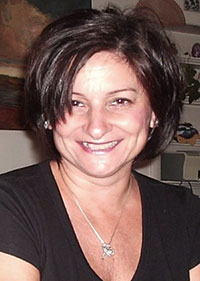 *
*
Diana Rose Lynch is a language teacher who teaches writing at Boston University. The Ekphrastic Review published her first poem in 2020. Her poetry was recently featured at Dogtown On My Mind: Reading and Discussion Celebrating Dogtown in the Writer’s Imagination Today. Discover Gloucester published two of her Dogtown poems in celebration of Gloucester 400. In addition, 400 Stories Project published her poetry in 2023 celebrating the unique history of the city of Gloucester. When she is not teaching, she writes poetry, gardens, and hikes. She lives in Ipswich, MA and is currently working on a collection of poetry.
Unwanted Tour Guide
I have become
a tour guide for the devil.

Diana Rose Lynch
Strangers roam my neighborhood
look for the devil’s footprint
stare in sorrow
at the saltbox colonial
that served to condemn
the local women
who made cows die,
who dried up maternal milk.
I know who they are
stand in the middle of the commons
read brochures, check maps.
I approach with my guinea charm
with my immigrant babble
these aren’t my stories
but I know them.
I proceed with facts
the devil’s jump from the belfry
the trial and conviction of witchy women,
flash of eyes
my uncle Nick
would be so proud of my delivery.
I live here.
I point to my garden
heirloom tomatoes, basil, vegetables,
they fill my migrant plate.
I make the earth feed me.
I make strangers
listen to the stories
of the people nobody wanted.
— Diana Rose Lynch
________________________________________
To have your work considered for the Lyrical send it to:
Doug Holder, 25 School St.; Somerville, MA 02143
dougholder@post.harvard.edu















Reading Unwanted Tour Guide as an immigrant, I immediately connected to the poem’s quiet negotiation between history and belonging. Diana Rose Lynch masterfully captures what it means to inherit narratives that aren’t ours but still shape our spaces. The poem’s interplay between the weight of the past—the trials, the myths, the ghosts—and the speaker’s presence in the town struck me deeply. There’s something profoundly moving about reclaiming space, not through erasure or defiance, but through quiet persistence: cultivating a garden, making the earth feed her, insisting on being seen. It speaks to the immigrant experience in a personal and universal way—how we learn the histories of the places we live, even as we build our own.